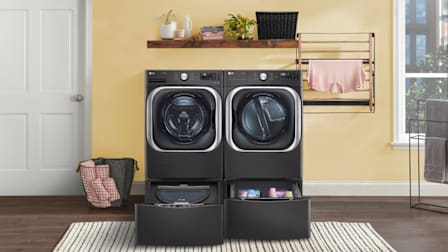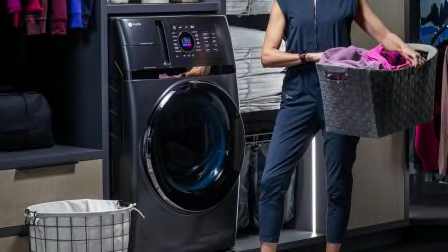Check Your Technique: Are Any Additives Okay to Throw in With a Load of Laundry?
Baking soda, borax, and vinegar are popular, but CR tells you whether laundry experts recommend them
When you shop through retailer links on our site, we may earn affiliate commissions. 100% of the fees we collect are used to support our nonprofit mission. Learn more.

In the search for the whitest whites and brightest brights, you may be tempted to add some unusual laundry additives you spot on social media to your washing machine. Or maybe you’ve spotted one of the many TikTok videos I’ve watched while doom-scrolling of people making DIY laundry detergent concoctions with half a dozen different powders, grated bars of soap, and sea salt (yes, the kind you use for cooking).
I was interested in finding out, once and for all, what products I could safely add to my laundry routine without damaging my washing machine or my clothes. To find out, I talked to CR’s in-house laundry expert, Richard Handel, and Alliance Laundry Systems’ content and media relations manager, Randy Radtke, who has over 15 years of experience in the laundry industry.
Baking Soda: Possibly Helpful for Those With Hard Water
Baking soda, often in combination with distilled white vinegar, is a popular DIY cleaning ingredient on social media. In washing machines, users claim adding a half-cup of the powder helps with odors and that it helps whiten white clothing that other detergents and laundry additives have failed to clean.
Borax: Useful for Subpar Laundry Detergents
Borax (Amazon, Walmart) is another multi-tasking powder formulated for use in laundry routines. It’s used primarily by people trying the involved (and maybe unnecessary) process of laundry stripping, but some people also add the powder directly to washing machines to improve the effectiveness of their laundry detergent.
Handel doesn’t think it’s necessary though, if you’re using the right laundry detergent. “Borax powder is positioned as a laundry detergent booster. It’s unnecessary if you use a top-rated detergent, but it may help a poor-performing detergent. Make sure it is not ingested and avoid contact with eyes and skin. It can irritate.” It probably won’t hurt your routine, but if you’re looking to simplify your laundry day, you could probably just upgrade your laundry detergent and go without it. If you plan to use it in your washer, make sure to follow the instructions on the box.
Distilled White Vinegar: Okay in Very Small Amounts, But Use With Caution
Distilled white vinegar (Amazon, Walmart) is touted as a more natural alternative to fabric softener, but the washing machine is one of the nine places around the home in which CR cautions against using vinegar, as it can damage rubber parts in some machines. On social media, there are videos of users adding anywhere from a splash of vinegar to a half cup, and even heavy-handed unmeasured pours of the liquid directly into washing machines.
Randy Radtke of Alliance Laundry Systems (makers of the oft-abused Speed Queen laundry appliances found in many laundromats across the country), told us he’s used small amounts of distilled white vinegar at home to help remove stubborn smells from garments, but ultimately cautioned against using any home remedies without a few considerations first. “The best advice I have is to do trial ‘spot’ runs of home remedies before deploying them broadly on your favorite garments and always consult your laundry equipment user’s guide.” Regardless of what you decide to do, be sure not to add the vinegar directly into your bottle of laundry detergent to avoid adverse reactions between the chemicals in the detergent and the vinegar. One content creator online found out the hard way the kind of messes this can cause.
Fabuloso Multi-Purpose Cleaner: Hard Pass in the Washing Machine
There are a lot of ways people use Fabuloso at home in off-label ways, including in washing machines. Like with other products that are not specifically formulated for use in washing machines, Handel does not recommend adding Fabuloso’s multi-purpose cleaner (Walmart, Target) to your washer. If you’re mixing the product with laundry detergent, you could cause an unexpected reaction in the chemicals of the two products. Over-sudsing is also a concern, which can cause damage to your washer and leave detergent residue on your garments.
Dettol Antiseptic Liquid: Keep the First-Aid Kit Out of the Laundry Room
Dettol Antiseptic Liquid is a U.K.-based product formulated for cuts, scratches, and insect bites, and to “kill germs on household surfaces” according to the label on the product. Though officially the antiseptic isn’t sold in the United States due to the FDA’s ban on antibacterial soaps containing certain ingredients that have not adequately demonstrated they are more effective than plain soap and water,
it is still a popular staple in Caribbean-American households around the U.S. and is available at grocery stores in many Caribbean communities (including those around my own Queens, N.Y., home). Some users on social media add the liquid to their washing machines to get rid of germs in their garments, too. The brand does list the washing machine as one place the product can be used, but because it is a concentrated product, the recommended dose is just 30 ml, an amount that could be tricky to measure out at home. Handel didn’t think adding this to your laundry was a good idea. He says, “This is a topical antiseptic to clean cuts and wounds. I don’t see a reason to use it in the washing machine.” The brand also makes a laundry sanitizer that is specifically formulated for use in washers, though we haven’t tested it before.
‘More is better’ definitely does not apply to laundry chemicals.
Content and Media Relations Manager, Alliance Laundry Systems
Dish Soap: Useful for Spot-Treating, But Not a Drop More
In my home, I use small amounts of dish soap to spot-treat greasy stains before throwing my laundry in the washing machine. Users online have taken it one step further, pouring dish soap directly into the drum of their washing machine drum or saturating a washcloth with the dishwashing liquid and then tossing it in the washer with your loads of laundry. We’ve written a separate article about why you shouldn’t try this trend at home. There are three major reasons: over-sudsing caused by using dish soap could damage your washing machine, doesn’t have the ingredients laundry detergents are formulated with that protect the quality of garments, and the ingredients in dish soap could irritate those at home with sensitive skin.
DIY Laundry Detergent: Not Worth the Potential Trouble
Of all the DIY laundry additives I’ve seen on social media, this is the most involved, and possibly the riskiest for your washing machine. To make these homemade laundry detergents, social media users grate bars of Zote or Fels-Naptha laundry soap, then mix the grated soap with half a dozen other ingredients including baking soda, borax, Arm & Hammer laundry booster, sea salt, and epsom salt. It’s unclear where or when exactly the trend started, but it is popular among many social media creators looking for more “natural” alternatives to store-bought products. Some of the top-liked videos under the search term “laundry detergent recipe” on TikTok have over 100,000 likes and hundreds of comments from other users sharing their own versions.
Handel doesn’t have any experience with these homemade concoctions, but said that the ingredients people are using to make the detergent and the ratios of the different ingredients could affect their effectiveness. Radtke doesn’t recommend these homemade concoctions either. “Be careful of things like dish soap or mixing multiple cleaners together, they could oversuds a machine and lead to those suds being left in garments—the same type of condition occurs when users add too much detergent.”
It’s impossible to know what the appropriate dosage is for these DIY laundry detergents, and commenters on some of these videos complain that the homemade powder detergents have clogged their front-loading washing machines, too. If you try this trend, make sure you aren’t using the same grater you use in the kitchen to grate your bars of soap, or any other of your usual kitchen utensils to mix the powder.
Lemon Juice: No Benefits to Speak of for Laundry
Squeezing half a dozen lemons to then add the juice to your washing machine’s detergent dispenser doesn’t sound like my favorite way to start my weekly laundry routine, but users online swear by the trick to rid garments of unpleasant odors. This is another hack Handel has addressed before on our site. He does not recommend you try adding lemon juice to your washing machine, and it’s probably a good idea to keep all other food out of your washing machine, too.
Hydrogen Peroxide: A Less Powerful Alternative to Chlorine Bleach
Hydrogen peroxide is great for getting blood out of mattresses and to spot-treat small blood stains on garments, but is adding the chemical to your washing machine an alternative to chlorine bleach to help whiten clothes, too? Handel says probably not. “Hydrogen peroxide is not as strong a bleaching agent as chlorine bleach. If you want to whiten or disinfect, chlorine bleach is the go-to bleaching agent.”
In a 2021 study published in the journal Molecules, researchers used a 3 percent solution of hydrogen peroxide in washing machines to find out if it helped remove stains and disinfect loads of laundry without damaging the integrity of the fabrics. They found that in the loads where hydrogen peroxide was added during the main wash portion of the cycle, it reduced more than 99.9999 percent of bacteria growth. Nearly all of the standard soils used in the study were cleaned from fabrics better with the hydrogen peroxide than without and it did not cause discoloration and no significant damage to the tensile strength in the washed fabrics. The study did not compare the results of using chlorine bleach versus hydrogen peroxide.
If you’re trying to avoid using bleach at home, this could work as an alternative, but don’t expect the same results as with chlorine bleach, which usually contains additional ingredients to brighten clothes and to avoid re-depositing dirt back onto clothes in the washer.
The Bottom Line on Laundry Additives
Before you add anything new to your washing machine, it’s important to carefully read the appliance’s user manual to make sure you aren’t inadvertently voiding your warranty. When in doubt, stick to products that are specifically formulated to be used in washing machines, and follow recommended dosage guidelines closely to avoid damaging your clothing and the inner working of your appliance. And, please, skip any hacks that recommend adding food to your washer.




